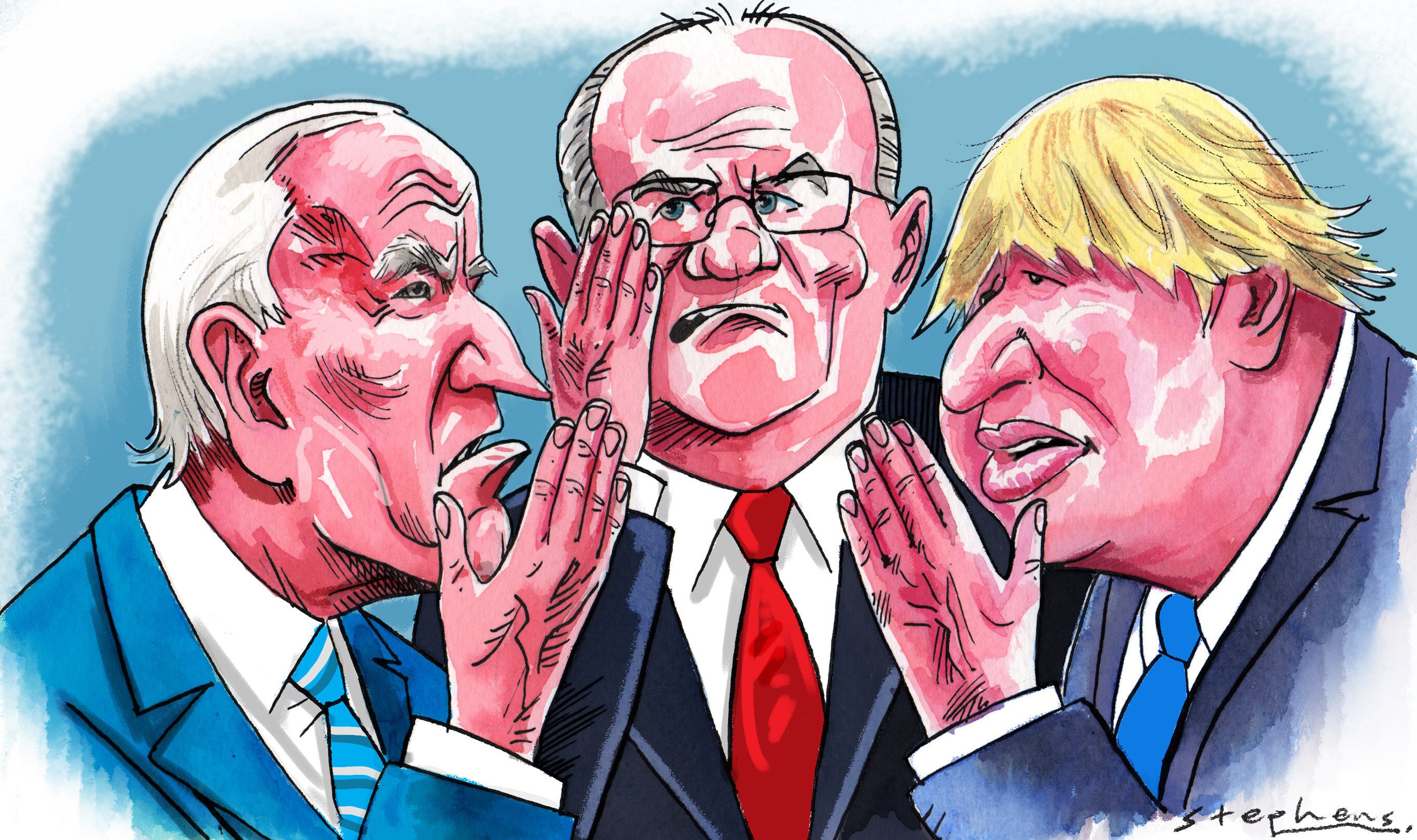
AUKUS of Hawks
(Russia) on 21 September 2021
by Viktor Pirozhenko (link to original)
A remarkable event concerning the U.S.-China standoff occurred at the end of last week, and it will have repercussions for politics throughout the entire world. The U.S., United Kingdom and Australia have announced the formation of an expanded trilateral security partnership, called AUKUS.
The U.S. has taken another step in forming a network of anti-Chinese alliances, this time at a major cost to its own reputation. The new partnership has already caused a scandal and serious controversy in the West: France took offense at the U.S. over the canceled submarine contract between France and Australia and recalled its ambassadors from Washington and Canberra for the first time in history.
The establishment of AUKUS shows that Washington is relying on its military strength to deter China. So far, indirectly, this situation also affects Russia, since another state with a nuclear submarine fleet (albeit without nuclear weapons yet) is emerging in the Asia-Pacific region. AUKUS' creation in this particular way is determined by a combination of several factors.
Apparently, the South China Sea, through which China's main trade route runs, is becoming an area of potential military confrontation between the U.S. and China. Washington has long tried to control the South China Sea under the principle of freedom of navigation. (By the way, the U.S. is trying to challenge the sovereignty of Russia over the Northern Sea route in the Arctic Ocean under the same pretext.)
A second flashpoint is now emerging over Taiwan. After Donald Trump took office, the U.S. became interested in deterring China, something that required renewed U.S. military and political engagement with Taiwan's government. Joe Biden continued this engagement, demonstratively violating the “One China” policy that the Americans once recognized as one of the main conditions for normalizing U.S.-China relations. U.S. Navy ships have increasingly encroached upon Chinese territorial waters in the Taiwan Strait.
In response to these provocations and threats to its security, China is strengthening its navy in general and increasing its military presence near the island of Taiwan in particular. That clearly annoys Washington.
A third important factor in establishing AUKUS was the cultural and civilizational affinity of the three Anglo-Saxon allies.
As a result, Australia, located relatively close to the South China Sea, has become an indispensable element in American plans. Nuclear submarines will eventually allow Australia to conduct long-range patrols in the Indo-Pacific region. Moreover, among the closest U.S. allies, only Great Britain has the technology to build nuclear-powered submarines, which these countries have pledged to build for Australia.
The trilateral partnership was created in addition to the already-existing Quadrilateral Security Dialogue of the U.S., Australia, Japan and India, which was also designed to stand against China. This U.S. initiative was once thought to be the backbone of a future alliance that would urge other countries to join it later.
Yet India participated very cautiously in all kinds of U.S. anti-Chinese actions because of its policy of strategic autonomy. Chinese experts believe that the Quad is a mechanism deliberately designed by the Americans to gain a foothold in India and push it into a confrontation with China. Japan, which adheres to non-nuclear principles in its defense strategy, is another problematic country in Biden's refined anti-Chinese strategy.
Things began to fall into place with the creation of AUKUS. Washington and London decided not to take any risks, and an entirely Anglo-Saxon partnership — without India and Japan — emerged as the new core of an anti-Chinese alliance. According to Chinese experts, Australia's unique position in the Quad could affect the policy choices of Japan' and particularly those of India because India had illusions that the U.S. would help it enhance its military technology. Yet once AUKUS was created, the U.S. had no plans to dissolve the Quad. The White House website posted information about the first face-to-face meeting of the Quad leaders in Washington on Sept. 24.
China has officially reacted with cautious condemnation. Beijing urged Canberra to abandon its outdated Cold War zero-sum thinking and narrow geopolitical concepts so it could truly improve its relations with China.
However, Chinese experts believe that AUKUS might lead to dangerous consequences involving a number of scenarios that could produce regional tension. That could extend to the point where Australia might become a target for a nuclear strike by China or Russia, for example, since Australian nuclear submarines would certainly serve U.S. strategic interests in the event of a military conflict.
Furthermore, providing weapons of mass destruction, nuclear technology and nuclear supplies to Australia, a non-nuclear-weapon state, violates the Treaty on the Non-Proliferation of Nuclear Weapons, thus setting a dangerous precedent for other countries.
Overall, the newly formed defense partnership is a risky attempt on the part of the Biden administration to restore American hegemony in the world. AUKUS holds China back from the Pacific Ocean, and the strange circumstances of the planned U.S. withdrawal from Afghanistan have created problems for China (and, for that matter, Russia) in the West, especially Central Asia.
In this context, China is continuing to stress that the Shanghai Cooperation Organization plays a pivotal role in stabilizing the world, and that there is a special need for strategic cooperation between Russia and China as its core members. On Sept. 17, the SCO leaders had the opportunity to discuss this new global security threat at the 21st SCO summit. The procedure for Iran's admission to the SCO was launched at the same time.
Following the summit, some Chinese experts admitted that the organization's influence may even extend beyond its borders; for example, by stimulating the economies of Central and Southeast Asia through trilateral cooperation with the Association of Southeast Asian Nations and the Eurasian Economic Union.


